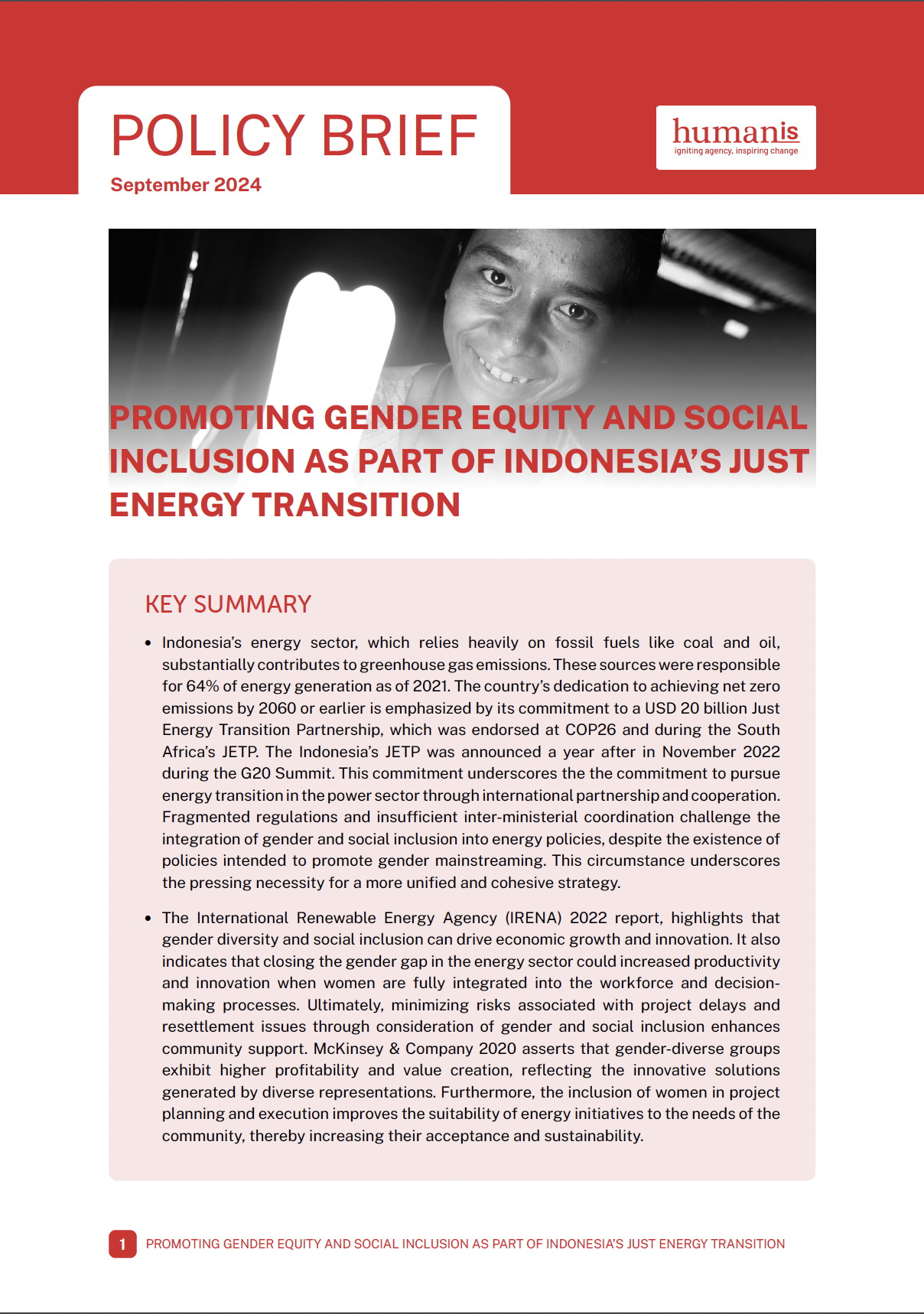
Climate Justice | October 9, 2024
Policy Brief – Promoting Gender Equity and Social Inclusion As Part of Indonesia’s Just Energy Transition
Sandra Winarsa, Dedy Haning, Siska Dewi Noya
Key Summary
- Indonesia’s energy sector, which relies heavily on fossil fuels like coal and oil, substantially contributes to greenhouse gas emissions. These sources were responsible for 64% of energy generation as of 2021. The country’s dedication to achieving net zero emissions by 2060 or earlier is emphasized by its commitment to a USD 20 billion Just Energy Transition Partnership, which was endorsed at COP26 and during the South Africa’s JETP. The Indonesia’s JETP was announced a year after in November 2022 during the G20 Summit. This commitment underscores the the commitment to pursue energy transition in the power sector through international partnership and cooperation. Fragmented regulations and insufficient inter-ministerial coordination challenge the integration of gender and social inclusion into energy policies, despite the existence of policies intended to promote gender mainstreaming. This circumstance underscores the pressing necessity for a more unified and cohesive strategy.
- The International Renewable Energy Agency (IRENA) 2022 report, highlights that gender diversity and social inclusion can drive economic growth and innovation. It also indicates that closing the gender gap in the energy sector could increased productivity and innovation when women are fully integrated into the workforce and decision-making processes. Ultimately, minimizing risks associated with project delays and resettlement issues through consideration of gender and social inclusion enhances community support. McKinsey & Company 2020 asserts that gender-diverse groups exhibit higher profitability and value creation, reflecting the innovative solutions generated by diverse representations. Furthermore, the inclusion of women in project planning and execution improves the suitability of energy initiatives to the needs of the community, thereby increasing their acceptance and sustainability.
- The analysis reveals numerous gaps in Indonesia’s energy policy landscape, with the National Energy Policy (NEP) or Kebijakan Energi Nasional (KEN) failing to adequately address gender equity. Additionally, the current energy laws are ineffective in addressing gender and inclusion issues. Fragmented regulations and inadequate coordination between national and local authorities impede efficient energy transition planning. The absence of gender-specific measures restricts the effectiveness of rural electrification efforts, even though they enhance access. In coal-dependent regions, informal workers face economic risks without adequate safety nets, and the Just Energy Transition Partnership (JETP) does not support rural electrification investments, which affects last-mile communities.
- Recommendations include the integration of gender and social inclusion (GESI) requirements into energy sector regulations, the updating of laws with a clear gender equity lens, and the establishment of a coordinating body to guide and monitor the implementation. It is imperative to improve inter-ministerial coordination and capacity-building to facilitate gender-inclusive energy planning. The JETP should incorporate rural electrification through cross-sector collaboration and blended financing. Improve tariff structure and enhance the rural electrification subsidy option open for non-PLN providers serving the rural areas. Lastly, it is imperative to establish social safety nets for informal workers in coal-dependent regions in order to alleviate the economic consequences of the coal phase-out.

